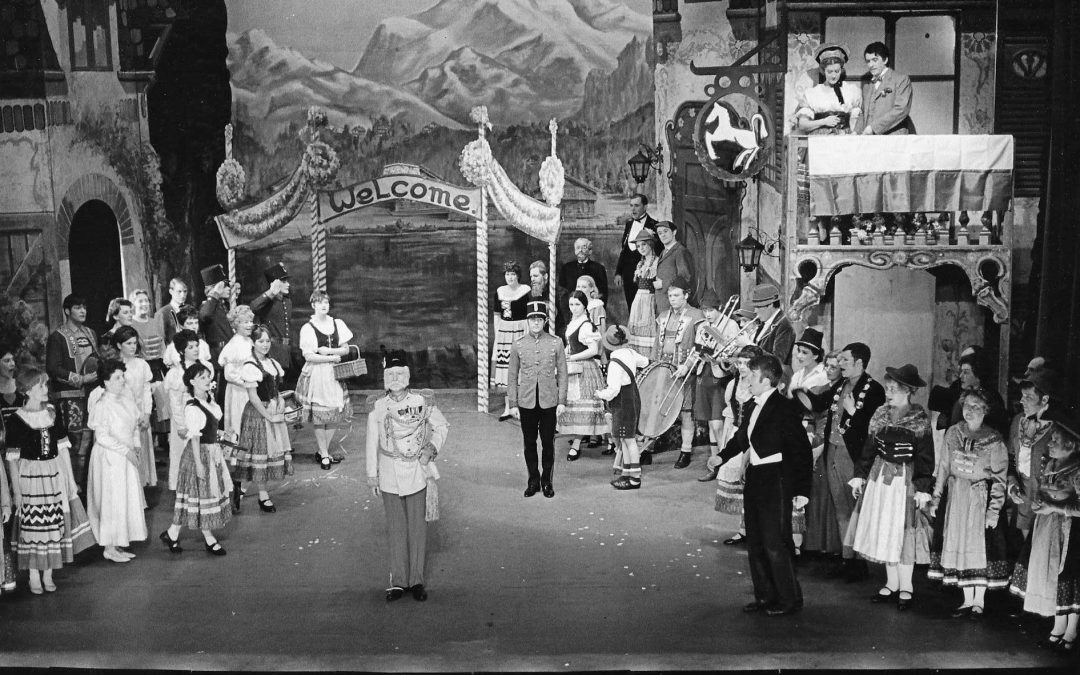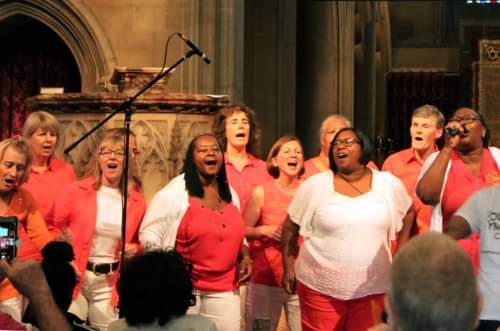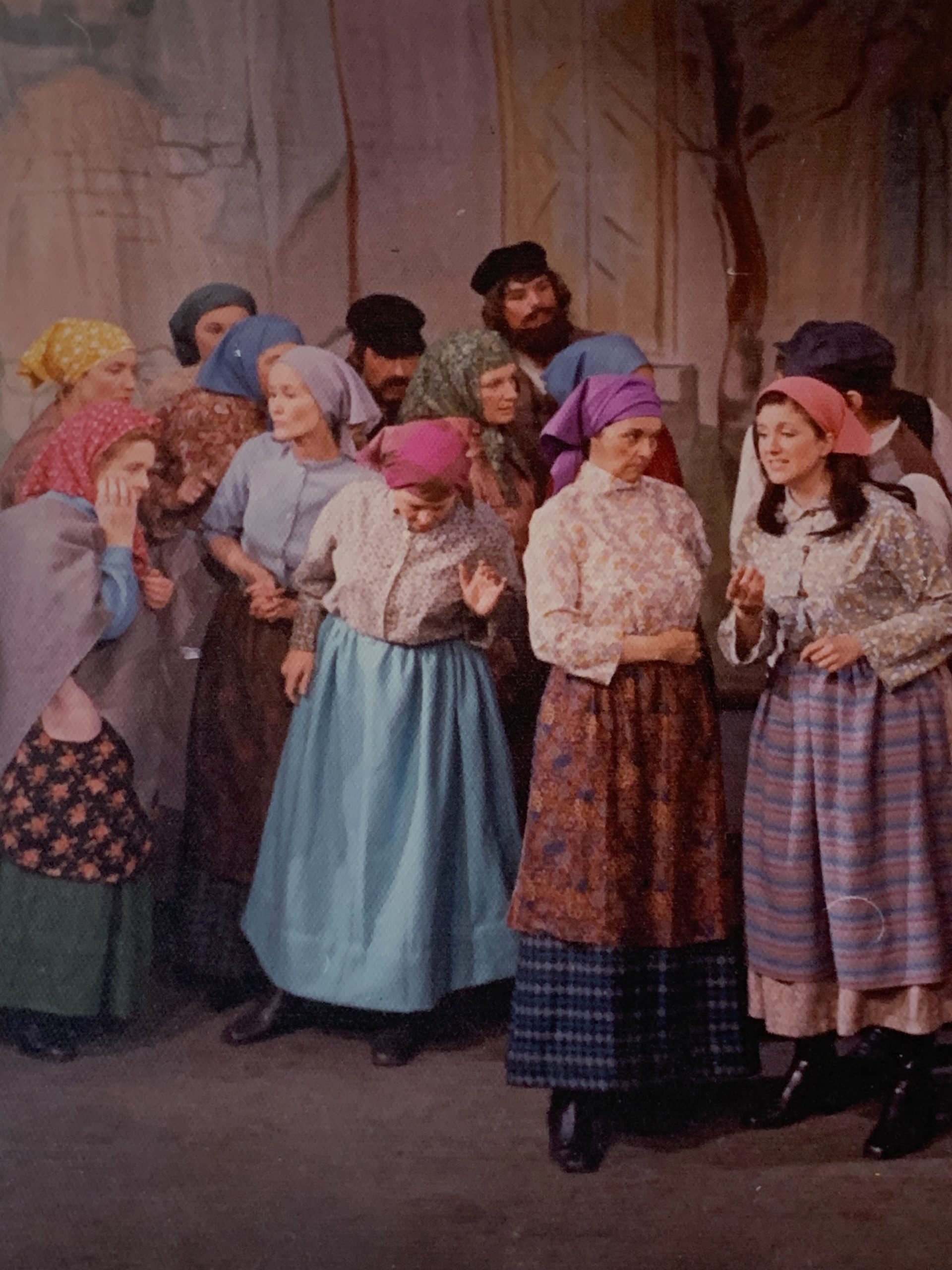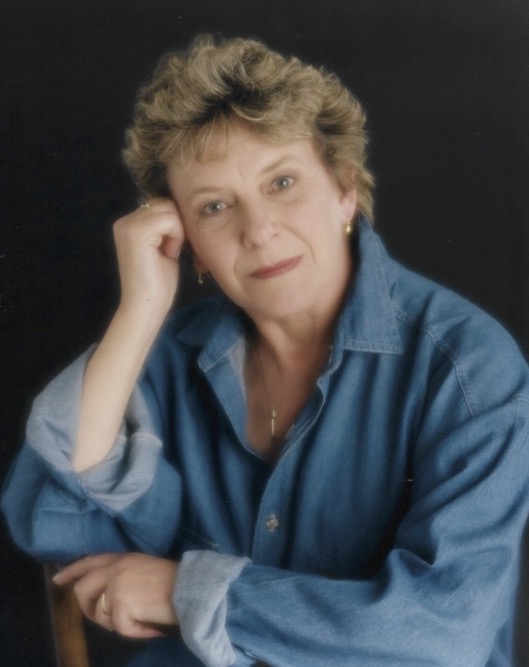The recent sad passing of John Bellamy, a stalwart actor with TTC & OHADS as well as others, and an ardent supporter of BROS productions at HHT and Richmond Theatre, led to his family unearthing a trove of programmes and photographs belonging to his late father Edward, a life-long member of BROS.
Due to the generosity of John’s immediate family these, and other artefacts, were kindly donated to the BROS Archive and have now been ameliorated into their respective resting places. As a thank you I undertook a brief resume of Edward Bellamy’s involvement in BODS (Barnes Operatic & Dramatic Society) and then later in BROS.
A pattern quickly emerged that might well be familiar with our current and recent past membership, so I thought I’d share these with you.
Early Beginnings
According to reliable sources (see below) Edward joined BODS in 1921 aged just 20. The circumstances are not known though like many young men of his time (not yet 21 therefore not yet a full adult) he probably also belonged to one of the many sports and social clubs active in Barnes at the time, or possibly one of the cycling clubs which proliferated in this post Great War era. Perhaps he had watched the BODS 1921 production of The Gondoliers or Yeomen of the Guard and was persuaded to join in the fun. There is a tantalising photo of the 1922 winter production of The Mikado in which he may appear, though as all the men are wearing ‘shaven head wigs’ they all look remarkably alike. However, as programmes for this show and the subsequent Merrie England do not exist currently, we can only surmise.
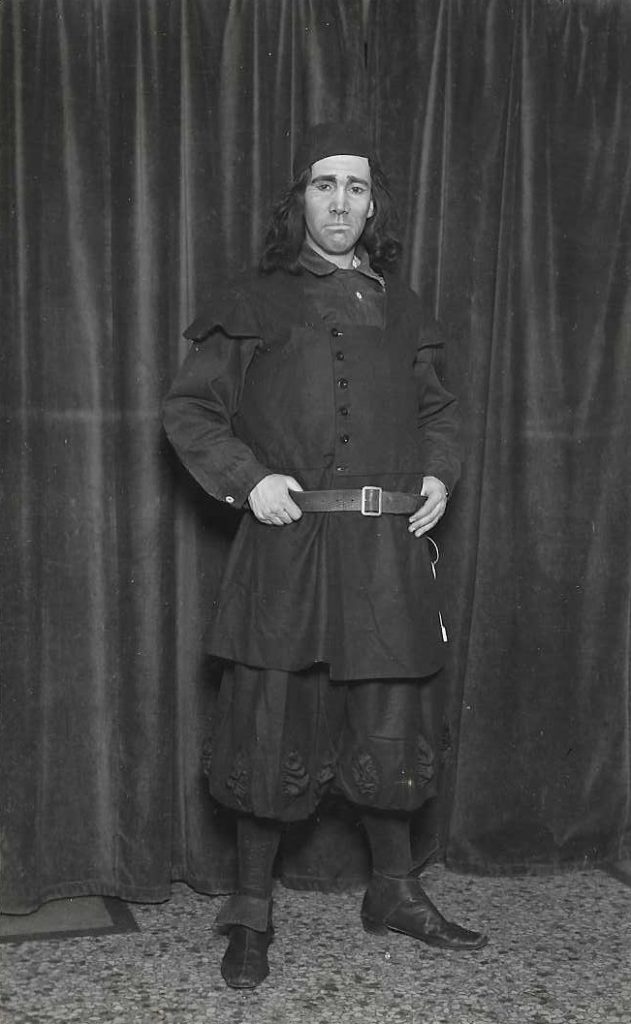
(Photo: Edward as Shadbolt in Yeomen of the Guard 1925)
His first known listing is in the chorus of the December 1923 production of Dorothy at the Barnes Picture House, and again in the April 1924 production of Patience. By December 1924 he has stepped out of the chorus to be featured in a minor supporting but named role as Silius in A Greek Slave. Then in 1925 production of Yeomen of the Guard he is pictured playing Shadbolt the gaoler, a meatier role still, and again in the 1926 Iolanthe he has a solo as Sergeant Willis indicating a fine bass-baritone voice. Edward is on the up. In April 1927 he plays Pish-Tush in his second Mikado again indicating he has become an established member of the group.
Shortly after joining BODS Edward also became a member of the Bank of England Operatic Society performing many times at the Scala Theatre in Charlotte Street (destroyed by fire in 1969) and taking singing lessons at the Guildhall School of Music.
Consolidation
Regrettably there are still some gaps in the archive in the late 1920s, so our information is sparser, however, the fact that Edward’s father Charles Bellamy is listed as a Patron from 1929 indicates that there is a parental expectation of longevity of membership for their son now working for the Bank of England in the City.
Then in January of 1931 Edward embraces cross-dressing to play the Baroness in Cinderella, the second of three pantomimes performed at that time. This indicates a comic ability, willingness to play the fool on stage and being comfortable in any role. The following year he repeated the process as he appeared as Min-Lee (a court lady) in Aladdin.
Clearly by now he was a fully accepted and recognised talent as in April 1932 he plays his first lead role as Jack Point in Yeomen of the Guard, and at the following AGM is elected to the Committee for the first time. Successive major roles then follow; Hassan in Rose of Persia, Ko-Ko in The Mikado, Major-General Stanley in The Pirates of Penzance, and The Lord Chancellor in Iolanthe. His Ko-Ko in particular evincing his first glowing review in The Barnes & Mortlake Herald of 29 April 1933, “The manner in which he interspersed his lines and songs with a wealth of comic gesture and grimace caused much merriment.” Of note also is the production of Iolanthe in December 1934 in which Edward’s new bride Kathleen played the eponymous lead.
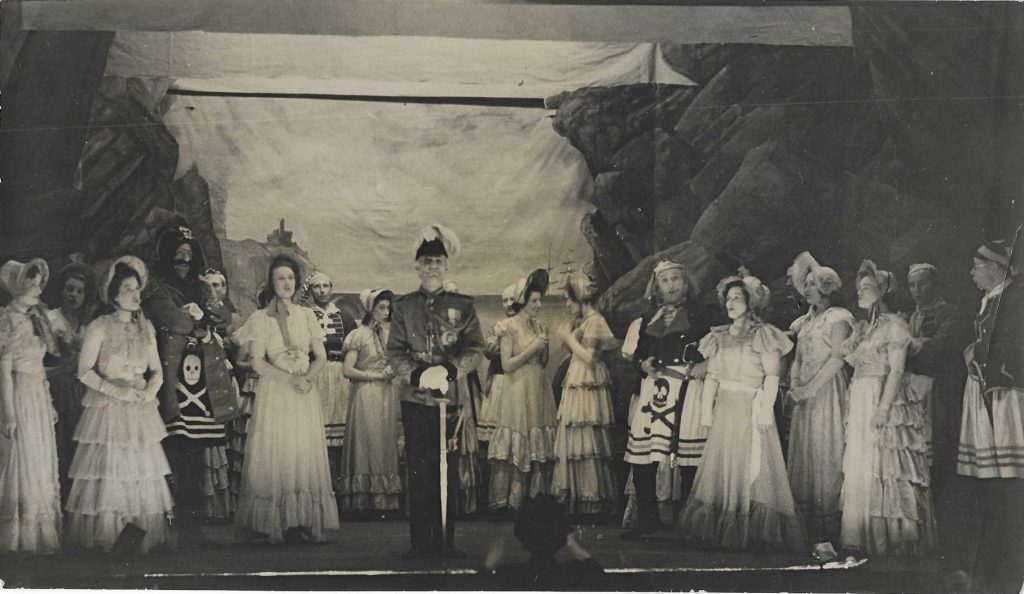
(Photo: Edward as Major-General Stanley in the Pirates of Penzance April 1934)
Full Establishment
Edward and Kathleen continued to perform alongside each other throughout the 1930s often directly opposite each other as in Merrie England in December 1935 when Edward played Sir Walter Raleigh and Kathleen Jill-all-Alone. Sadly, but inevitably, this purple patch in the society’s history could not go on forever and have co-performed in some six productions Kathleen fell pregnant with the soon to be born John in 1937 just as the first rumblings of impending war began to be felt across Europe. In 1938 Edward replaced Charles as a society Patron, and the Bank of England moved its staff out of London as the war clouds darkened. Edward remained on the committee until after the April 1939 production of A Country Girl, at which time the society paused its activities with its future uncertain.
During the War members of BODS continued to perform concerts and other fund-raising activities for the war effort, but Edward & Kathleen with their growing family in Whitchurch Hampshire were too far away to be actively involved.
Re-activisation
The Bellamy family returned to their Barnes home in 1945 and by the spring of 1946 discussions were being had as to whether or not to reactivate BODS. Thankfully for us the decision was yes, though it took until May 1947 before the first post war production of Iolanthe hit the stage. Edward was re-elected to the committee while Charles was made a Vice-President.
In many respects the first few post war years saw BODS return to its pre-war days with two productions a year in which Edward was usually cast in principal roles, reprising many he had played before but adding others to his canon of roles such as Sir Ruthven Murgatroyd in Ruddigore in December 1949 and Simplicitas in The Arcadians in 1950.
Kathleen now a full-time mother does not feature even in the choruses of these shows but would regularly be seen at rehearsals wielding a tea pot during breaks or doing any of the myriad supporting roles necessary to keep the society functioning. In 1952 she appears as a Patron for the first time in the programme listings. That same year Edward is elected Assistant Secretary on committee, and in 1953 Kathleen too takes her place as a committee member. Both are now key players in the management of the society with Kathleen taking on the role of Box Officer Manager for several years. Two years later in 1955 Edward was elected Honorary Secretary, a role he will hold for the remainder of the decade seeing the company past the milestone of its 50th Anniversary in 1958 where he played Frank in Pink Champaign before reprising his Ko-Ko in 1959.
Joining the Old Guard
The 1960s saw an influx of new talent and new ideas vital to keep any society going, and Edward decided it was time for younger folk to take the helm on committee, stepping down in 1960 (though not for long). This was also the time where he was promoted to more senior management at the Bank leaving less time for social activities. It seems however his desire for time off was short lived as he reappears on committee in late 1961 and is elected Chairman in 1963. This was the era where Geoffrey Needs was actively pursuing BODS desires to perform at Richmond Theatre so a strong committee would have been very necessary in these often-difficult negotiations.
As Chairman Edward oversaw the first BODS production of a ‘modern musicals’ Carousel and South Pacific directed by Chris Ekin-Wood in 1963 & 1964 respectively. This was followed in 1965 by Most Happy Fella as negotiations with Richmond Theatre progressed and the society contemplated a name change to reflect its hoped-for new status.
In 1965 Edward was elected a Vice-President as Carousel was revisited to be the first show of the newly named Barnes & Richmond Operatic Society to be performed at our wonderful local Matcham designed theatre. As a Vice-President Edward began to play the smaller supporting roles in Richmond shows appearing as Maestro Pisoni in Song of Norway in 1967, Mr Macready in Robert & Elizabeth in 1968 and The Emperor in White Horse Inn in 1969.
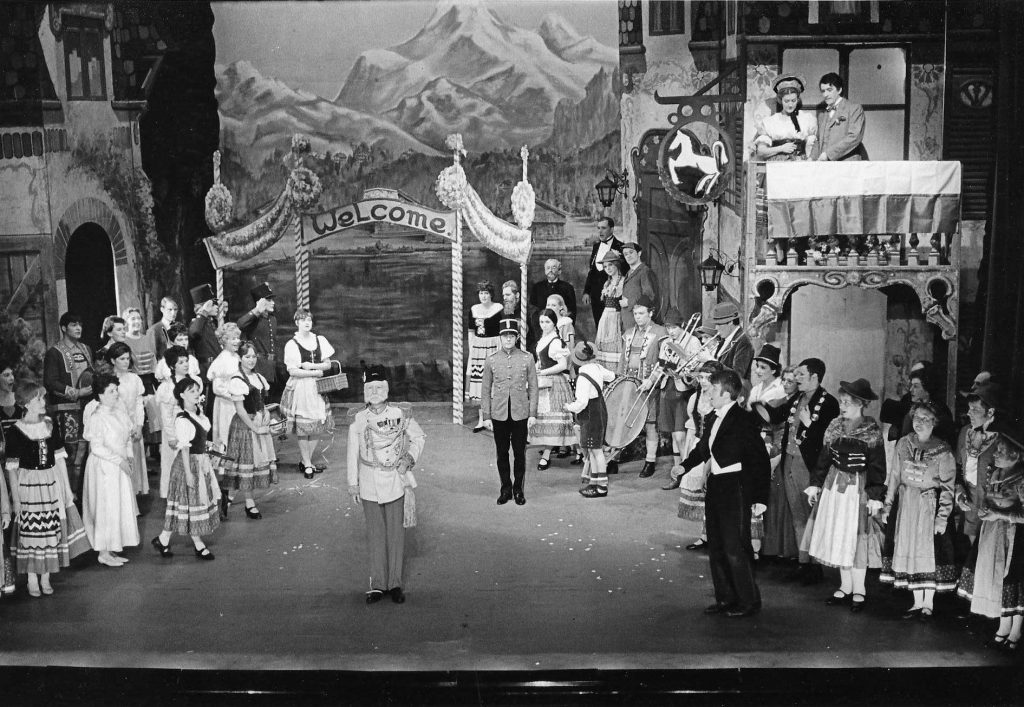
(Photo: Edward on stage at Richmond Theatre as the Emperor in White Horse Inn – March 1969
Unfortunately, the 1970 production of Jorrocks at Richmond failed to sell (just as it had in the West End the year before) and the company found itself in dire straits. Undaunted the society took pledges and interest free loans from members and began to rebuild. Edward appeared in the comic role of Fleet Foot in Little Mary Sunshine at York House where his innate comic ability would have shone, and by April 1972 BROS was back at Richmond with a much-praised Oklahoma, and Edward had been elected President. – a role he would hold for the next four years seeing the company safely through its 75th Anniversary production, and European Premiere of Anne of Green Gables in March 1974 at Richmond Theatre.
It was in this year that Edward & Kathleen were invited to an audience with Elizabeth the Queen Mother to celebrate and mark their long association with the company, in Edward’s case already over 50 years.
Article in the Epsom & Ewell Herald of 17 January 1974 showing Edward & Kathleen at home following receipt of their invitation to St James’s Palace for an audience with Queen Elizabeth the Queen Mother in March.
The Final Years
In 1975 Edward was diagnosed as having motor neurone disease and stepped down from his role as President. Sadly, he died the following year, and two years later Kathleen was elected a Vice-President having left their family home in Epsom to live in Norfolk near their daughter Susan and her family.
Postscript
It is because of the dedication of such past members as these that BROS remains a vibrant and successful company, and I am indebted to Susan Morris (Bellamy) for her help in compiling this short memory of a BROS family from a past generation.
Compiled and written by Wesley Henderson Roe – Archivist BROS TC

